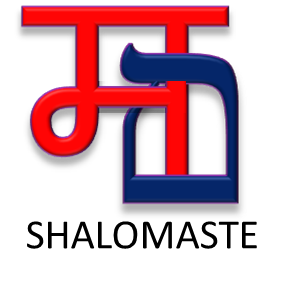With the destruction of its global center, India turned
inward and many of its people left to resettle in lands that had been part of
the Indus trading region in the Middle East and along Africa's coastline. The
local Egyptians called these Indo-European people by many names including the
Hyksos and the people of Punt.
Why does this matter? It matters because by the time of the
Exodus, 1,000 years after the Great Flood, Egyptian society was a mix of
Afro-Egyptians and two types of Indo-Europeans -- the Hyksos and the Hebrews.
While the Indo-European Hyksos and Hebrews saw themselves as very different, to
the African Egyptians these two groups were essentially the same - like
Catholic and Protestant Christians.
Abraham, Joseph and "The
Promised Land"
About 500 years after the flood, the Bible tells of the
first Hebrew - a man called Abraham. His story will inspire billions of people
for more than 5,000 years and he will be considered the founding father of
modern Judaism, Christianity and Islam.
Abraham was a Hittite, a culture that combined Indian and
Persian traditions. When he and his wife began to follow God, they changed
their names from the original (and Indian) versions Abram and Sarai to Abraham
and Sarah indicating a new western culture was being born in the post-India
world.
In the Bible, God promises Abraham he will have a homeland
for the many people who will be inspired and "fathered" by him. God says this
"Promised Land" will be somewhere between Egypt and the Euphrates River, and it
will be a gift. In other words, the Hebrew people expected they would receive
their "promised land" as a reward for their righteous behavior and "true faith"
ways.
Several hundred years later, the Hebrew Joseph saves Egypt's
people from famine and Egypt's King gives the Hebrew people a homeland in the
fertile region of northeast Egypt called Goshen. To the Hebrew people of that
time, this was God's Hand at work. It was absolute proof of the power of their
faith. They had been given a homeland in return for Joseph's great godliness
and humanity and it was within the region described to Abraham. The covenant
had been fulfilled and it was a time of great rejoicing.
True, they were only a semi-autonomous province of Egypt --
like today's Quebec within Canada, the Basque region of Spain or the Punjab in
India --but that didn't matter did it?
Will Somebody Think
of the Children?
With their homeland in Goshen, the Hebrews flourished and
prospered and, along with the Hyksos, the two groups of Indo-Europeans -- though
minorities within African Egypt -- had become the cultural leaders, business
tycoons and the aristocracy of the day
For most Hebrews, this was a sign of their continued
blessing by God and the Hyksos felt the same way. But the success of these two
cultures led inevitably to intermarriage, and with intermarriage came the fear
of assimilation and a loss of distinction -- particularly among some Hebrews.
At the end of the Bible's first book, Genesis, we read about
the Hebrew Joseph. But in the opening pages of the second book, Exodus, there
are still Hebrews but with them is a new group called "the sons of Jacob" or
Israelites. These Israelites are, by definition, a separatist group because
they are named as a separate, sub-group of the Hebrew people who would likely
think of themselves as "sons of Joseph" - the son of Jacob who saved Egypt and
gave them their homeland.
When one group decides to separate from a larger community,
the inevitable reason has something to do with maintaining some form of
ideological "purity," and it was the driving force behind the creation of the
separatist, political movement in Egypt the Bible calls the "sons of Jacob."
Imagine the Times
Imagine you are a Hebrew living in Goshen at this time. Most
are "modern people" who don't see a certain amount of assimilation or
intermarriage as a problem. They live in the "modern world" and still maintain
their traditions within the family and in personal worship. This was true of
the Hebrews and the Hyksos. But to Moses and the Sons of Jacob, assimilation
and intermarriage were huge problems that could only be solved by separating
Goshen from Indo-European Egypt and making it an independent nation of God on
its own.
Next Page 1 | 2 | 3 | 4 | 5 | 6 | 7
(Note: You can view every article as one long page if you sign up as an Advocate Member, or higher).





